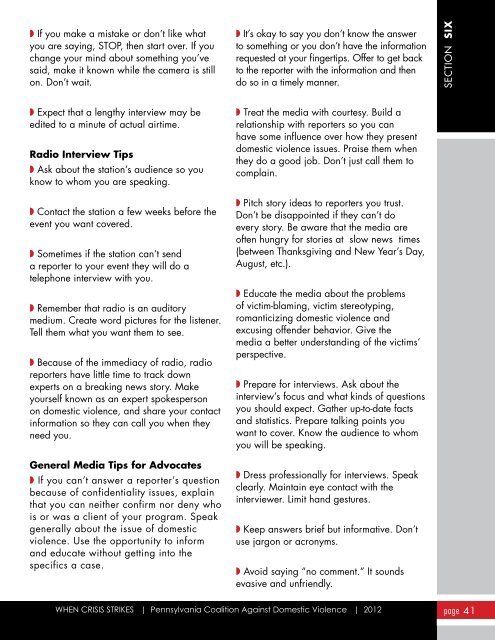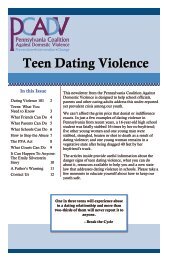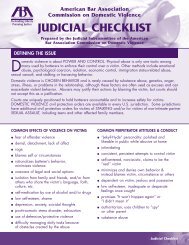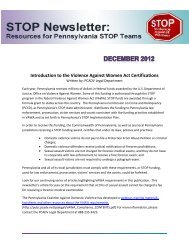Toolkit with Report Form - Pennsylvania Coalition Against Domestic ...
Toolkit with Report Form - Pennsylvania Coalition Against Domestic ...
Toolkit with Report Form - Pennsylvania Coalition Against Domestic ...
You also want an ePaper? Increase the reach of your titles
YUMPU automatically turns print PDFs into web optimized ePapers that Google loves.
◗ If you make a mistake or don’t like what<br />
you are saying, STOP, then start over. If you<br />
change your mind about something you’ve<br />
said, make it known while the camera is still<br />
on. Don’t wait.<br />
◗ It’s okay to say you don’t know the answer<br />
to something or you don’t have the information<br />
requested at your fingertips. Offer to get back<br />
to the reporter <strong>with</strong> the information and then<br />
do so in a timely manner.<br />
Section Six<br />
◗ Expect that a lengthy interview may be<br />
edited to a minute of actual airtime.<br />
Radio Interview Tips<br />
◗ Ask about the station’s audience so you<br />
know to whom you are speaking.<br />
◗ Contact the station a few weeks before the<br />
event you want covered.<br />
◗ Sometimes if the station can’t send<br />
a reporter to your event they will do a<br />
telephone interview <strong>with</strong> you.<br />
◗ Remember that radio is an auditory<br />
medium. Create word pictures for the listener.<br />
Tell them what you want them to see.<br />
◗ Because of the immediacy of radio, radio<br />
reporters have little time to track down<br />
experts on a breaking news story. Make<br />
yourself known as an expert spokesperson<br />
on domestic violence, and share your contact<br />
information so they can call you when they<br />
need you.<br />
General Media Tips for Advocates<br />
◗ If you can’t answer a reporter’s question<br />
because of confidentiality issues, explain<br />
that you can neither confirm nor deny who<br />
is or was a client of your program. Speak<br />
generally about the issue of domestic<br />
violence. Use the opportunity to inform<br />
and educate <strong>with</strong>out getting into the<br />
specifics a case.<br />
◗ Treat the media <strong>with</strong> courtesy. Build a<br />
relationship <strong>with</strong> reporters so you can<br />
have some influence over how they present<br />
domestic violence issues. Praise them when<br />
they do a good job. Don’t just call them to<br />
complain.<br />
◗ Pitch story ideas to reporters you trust.<br />
Don’t be disappointed if they can’t do<br />
every story. Be aware that the media are<br />
often hungry for stories at slow news times<br />
(between Thanksgiving and New Year’s Day,<br />
August, etc.).<br />
◗ Educate the media about the problems<br />
of victim-blaming, victim stereotyping,<br />
romanticizing domestic violence and<br />
excusing offender behavior. Give the<br />
media a better understanding of the victims’<br />
perspective.<br />
◗ Prepare for interviews. Ask about the<br />
interview’s focus and what kinds of questions<br />
you should expect. Gather up-to-date facts<br />
and statistics. Prepare talking points you<br />
want to cover. Know the audience to whom<br />
you will be speaking.<br />
◗ Dress professionally for interviews. Speak<br />
clearly. Maintain eye contact <strong>with</strong> the<br />
interviewer. Limit hand gestures.<br />
◗ Keep answers brief but informative. Don’t<br />
use jargon or acronyms.<br />
◗ Avoid saying “no comment.” It sounds<br />
evasive and unfriendly.<br />
When Crisis Strikes | <strong>Pennsylvania</strong> <strong>Coalition</strong> <strong>Against</strong> <strong>Domestic</strong> Violence | 2012<br />
page 41








